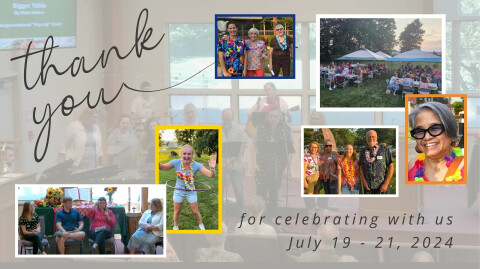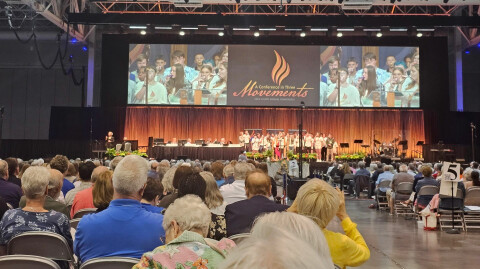You may know the scenario. You’re participating in a meeting, listening to someone share an idea or express an opinion and then another person disagrees. Suddenly, participants at the table are choosing sides. Voices are raised occasionally, and feelings sometimes get hurt. As a person of faith, you wonder, “What’s next? Is it EVER possible to find grace during this scenario?”
Many Christians, including John Wesley, would say “yes!”
Through holy conferencing, a process of Christian communication – participants are encouraged to discern the Holy Spirit in their decision-making process. This sacred form of communication, however, is not limited to difficult discussions. As Christians, United Methodists are urged to bring holy conferencing into all their interactions with one another and the world.
In his sermon, Catholic Spirit, John Wesley (the founder of the Methodist movement) shares his thoughts on the practice of Holy Conferencing as a means of grace when he stated: “Though we cannot think alike, may we not love alike? May we not be of one heart, though we are not of one opinion? Without all doubt, we may. Herein all the children of God may unite, notwithstanding these smaller differences.”
In this sermon that teaches us Methodist theology and doctrine, Wesley advocates for the following key principles:
- Universal Love: Wesley emphasizes that love is owed to all humankind, as expressed in the noble law: “You shall love your neighbor as yourself.” (Mark 12:30 – 31, Leviticus 19:18) This love extends beyond mere acquaintances or friends; it includes even enemies. Jesus taught us to love our enemies, bless those who curse us, and pray for those who mistreat us.
- Special Love for Those Who Love God: While universal love is essential, there is a special love owed to those who love God. In the Old Testament, David expressed delight in fellow believers who excel in virtue. In the Gospels we see Jesus encouraging his disciples to live into a new commandment, “I give you a new commandment, that you love one another. Just as I have loved you, you also should love one another. By this everyone will know that you are my disciples, if you have love for one another.” (John 13:34 – 35)
- The Catholic Spirit: Wesley’s point is that a “catholic” spirit looks beyond doctrinal differences, creeds, and opinions. What unites Christians is a heart filled with love for God and one another, actively seeking to do God’s will.
Here, Wesley encourages a love that transcends boundaries, embracing all humanity while recognizing the unique bond among those who love God.
In the United Methodist Church, Wesley’s teaching is lived out most fully through our practice of holy conferencing, which focuses on the ability of laity and clergy to come together and discuss and discern difficult topics guided by the Holy Spirit (and ultimately is a part of our witness to the world!). We United Methodists engage this practice globally, regionally, locally, and in each community of faith when we gather for General Conference, Jurisdictional Conference, Annual Conference, Charge Conference, and even when our leadership board, small groups, and ministry huddles come together!
So, why is this practice so important to United Methodists and to John Wesley? Because it is a means of grace – as important to our formation as reading the Bible, prayer, worship and participating in the Sacraments. Christian conferencing is a way for us to discern the will of God by listening for God’s voice as we are in conversation with one another. It is about growing in holiness. It’s about being with God and one another – listening, discerning, and living out love. It’s NOT about doing, producing, or following a particular set of rules so we are more holy.
Bishop Christian Alsted (Nordic-Baltic Episcopal Area) said it best when she pointed out, “Christian conferencing is not a technique, not a particular process or a set of rules to regulate our conversation. It’s a part of our theological DNA, like praying.” Amen!
REFLECT & READ
Bring to mind a time when you have had to have a difficult conversation. Then read Paul's letter to the community of faith in Colossians 3:12 – 17.
WRESTLING WITH THE WORD
- What are some of the qualities Paul tells us to have? Why are these important when we find ourselves in a challenging conversation? What qualities are the hardest to maintain?
- Look at verse 16. How is Paul calling us to holy living and holy conversation?
- What spiritual disciplines does Paul name in this passage?
NEXT STEPS
- How can you apply this scripture to the conversation you recalled earlier? How might we apply this scripture in conversations that are happening now in our community?
- How can we prepare ourselves for these difficult conversations? What spiritual disciplines do we want to shape us?
- What is peace? What does it mean to create peace at home, with our peers, in the community and the world if we believe that peace is more than simply the absence of conflict?
- What are some concrete examples of what living out this passage could look like in your family/church/community and in the world right now? What is one small step you can take toward making this a reality?
ADDITIONAL SCRIPTURES
- Ephesians 3:20-21
- Matthew 18:15-20
- Hebrews 10:24-25
- 1 Thessalonians 5:11
- 1 Peter 2:9
- Acts 2:42-47
PRAY
Dear Lord, we acknowledge the significance of our Methodist roots. Tonight, I bring before you the weight of difficult conversations I have experienced recently, knowing that they are often a part of our lives. Grant compassion to understand one another, kindness to speak with grace, humility to approach with an open heart, gentleness to handle delicate matters, and patience to listen and discern. May your love be the binding force that unites the community of faith and may the peace of Christ guide us in our words and actions. In Christ's name, we pray for forgiveness, growth, and unity. Amen.




